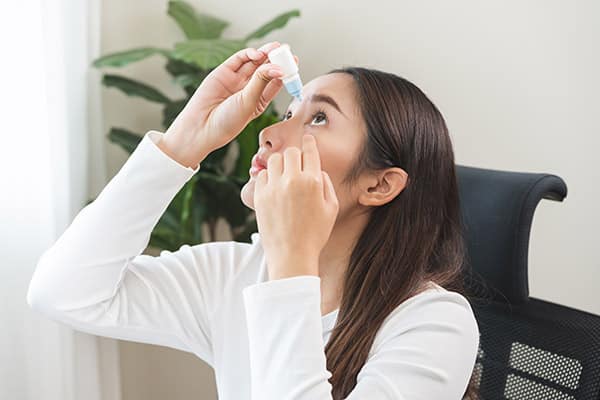How Dry Eye Affects You
How Dry Eye can negatively impact your vision – and your life
The symptoms of Dry Eyes can be uncomfortable – and a big burden. Basic visual tasks, such as reading, using a computer, driving or watching television may become difficult. Wearing contact lenses may be impossible. You might find that symptoms worsen later in the day, keeping you from enjoying activities you want to take part in. Dry Eye is a chronic disease that needs treatment to stop the tear film from destabilizing and symptoms from worsening. Without proper management, the deterioration may look like this:
- Increased evaporation of tears
- Unstable tear film
- Damage to the eye surface
- Further discomfort
- Inflammation and cell damage
- Fluctuation and decrease in vision

What are some of the risk factors for Evaporative Dry Eye?
- Women are more likely to have dry eye conditions, exacerbated by hormone replacement therapy, pregnancy, or the use of oral contraceptives.
- Hormonal changes in women during menopause – particularly decreasing levels of estrogen – can cause thickening of the oils secreted by the meibomian glands, which results in blockages.
- Decreased estrogen levels may enhance conditions under which staphylococcal bacteria can proliferate in the meibomian glands. This results in a decreased oil secretion rate.
- People who wear contact lenses, or who have undergone LASIK may be more susceptible to dry eye syndrome.
- Medications: antihistamines, decongestants, blood pressure medications, and antidepressants can affect the quality of tears.
- Eye conditions such as blepharitis (inflamed eyelids), inflammation of the cornea, or entropion (when your eyelids turn inward) can also result in dry eye.
- Environmental conditions: Wind and dry climates can affect how quickly your tears evaporate.
- Additional factors that may cause or exacerbate meibomian gland dysfunction include age, contact lens use and hygiene, cosmetic use, and illnesses such as diabetes, arthritis, or thyroid disease.
Common symptoms of Dry Eye
- Dryness
- Discomfort and irritation
- Grittiness or feeling of a foreign body in the eye
- Burning or stinging sensation
- Tearing
- Redness
- Discharge
- Tiredness
- Itching
- Vision disturbance
- Sensitivity to light
Evaporative Dry Eye can be a thing of the past – with LipiFlow
LipiFlow® works with the thermal pulsation of the meibomian glands by removing gland blockages and improving gland function. Reduce your dependence on drops or maybe even eliminate them. LipiFlow® is designed to provide relief, so you can get on with your life.
Find the information you need to educate yourself about the leading cause of Dry Eye and the LipiFlow® treatment by visiting the LipiFlow® website here.
If you’re ready to get started, call us to schedule an assessment appointment. Ask your doctor if you have MGD and if LipiFlow® is right for you.

